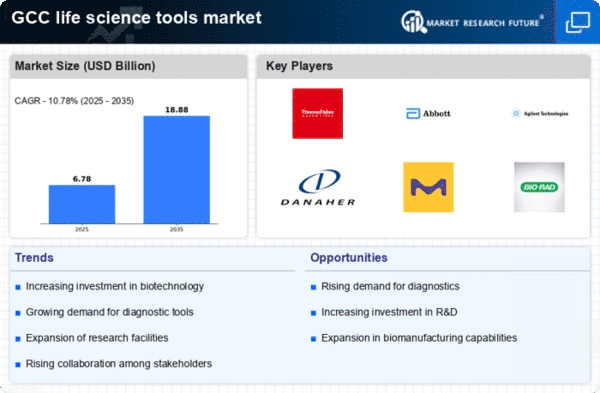Investment in Healthcare Infrastructure
The life science-tools market is positively impacted by the ongoing investment in healthcare infrastructure across the GCC. Governments are prioritizing the enhancement of healthcare facilities, which includes the establishment of research centers and laboratories equipped with advanced life science tools. This investment is projected to exceed $10 billion over the next few years, reflecting a commitment to improving healthcare delivery and research capabilities. As healthcare infrastructure expands, the demand for sophisticated life science tools is likely to increase, supporting various applications from diagnostics to therapeutic development. This trend not only strengthens the life science-tools market but also contributes to the overall advancement of healthcare in the region.
Growing Demand for Personalized Medicine
The life science-tools market is experiencing a notable surge in demand for personalized medicine, driven by advancements in genomics and biotechnology. This trend is particularly pronounced in the GCC region, where healthcare systems are increasingly adopting tailored treatment approaches. The market for personalized medicine is projected to reach approximately $2.5 billion by 2026, reflecting a compound annual growth rate (CAGR) of around 10%. This growth is likely to stimulate the life science-tools market, as innovative tools and technologies are essential for the development and implementation of personalized therapies. Furthermore, the integration of artificial intelligence in diagnostics and treatment planning is expected to enhance the efficiency and effectiveness of personalized medicine, thereby further propelling the life science-tools market in the GCC.
Collaboration Between Academia and Industry
The life science-tools market is benefiting from the growing collaboration between academia and industry in the GCC. Universities and research institutions are increasingly partnering with private companies to drive innovation and commercialization of life science technologies. This collaboration is expected to foster the development of new tools and methodologies, enhancing the capabilities of the life science-tools market. With research funding projected to increase by 20% in the coming years, these partnerships are likely to yield significant advancements in areas such as drug discovery and diagnostics. The synergy between academic research and industry expertise not only accelerates the development of innovative solutions but also strengthens the overall ecosystem of the life science-tools market.
Rising Focus on Infectious Disease Research
The life science-tools market is seeing an increased emphasis on infectious disease research, particularly in the GCC region. Governments and private entities are increasingly allocating resources to combat infectious diseases, which has led to a surge in research initiatives. The market for infectious disease diagnostics is expected to grow by approximately 15% annually, driven by the need for rapid and accurate testing solutions. This trend is likely to create substantial opportunities for life science-tools providers, as researchers require advanced tools for diagnostics, monitoring, and vaccine development. The emphasis on infectious disease research not only enhances public health outcomes but also stimulates innovation within the life science-tools market, fostering the development of cutting-edge technologies.
Expansion of Biopharmaceutical Manufacturing
The life science-tools market is significantly influenced by the expansion of biopharmaceutical manufacturing in the GCC. As countries in the region invest in building state-of-the-art biomanufacturing facilities, the demand for advanced life science tools is expected to rise. The biopharmaceutical sector is projected to grow at a CAGR of 12% over the next five years, leading to an increased need for tools that support research, development, and production processes. This expansion not only enhances local capabilities but also positions the GCC as a competitive player in the global biopharmaceutical landscape. Consequently, the life science-tools market is likely to benefit from this growth, as manufacturers seek innovative solutions to optimize production efficiency and ensure compliance with regulatory standards.

















